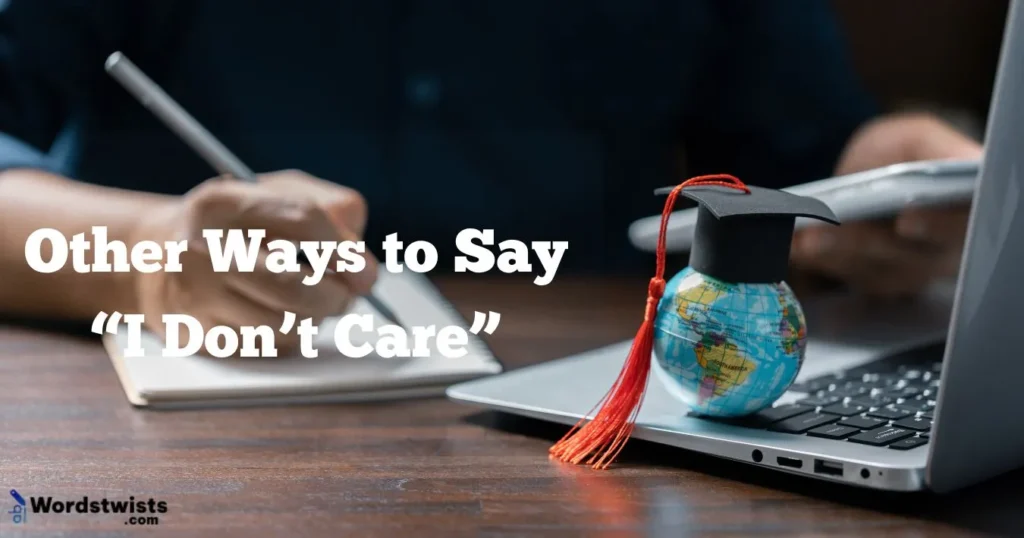Have you ever felt stuck using the phrase “I don’t care” over and over again? It’s such a common expression, but let’s be honest—it can sound a bit blunt, cold, or even rude if repeated too often. When you’re trying to express indifference, a lack of concern, or that something simply doesn’t bother you, relying on the same words every time can make your message feel flat or uninspired.
That’s why exploring other ways to say “I don’t care” is so helpful. It gives your communication more nuance, clarity, and even personality. Whether you’re texting a friend, drafting a professional email, or just trying to be more expressive, having a variety of phrases at your fingertips can make all the difference.
In this post, I’ll walk you through 25 smart, natural alternatives to “I don’t care” that help you say exactly what you mean—without sounding harsh or dismissive. You’ll find clear explanations, real-life usage examples, and insights into why each option works so well.
Ready to sound more thoughtful and confident in how you express apathy or emotional detachment? Let’s dive in and discover these powerful phrases that speak volumes—without overusing the same old line.
Ways to Say I Don’t Care
1. It’s all the same to me
This phrase shows that you have no strong feelings or preference about something. It’s casual and polite, great for conversations when you want to express indifference without sounding harsh.
Examples:
- You can pick any restaurant; it’s all the same to me.
- Whether we watch a movie or play games, it’s all the same to me.
- I’m okay with either plan, it’s all the same to me.
- It’s all the same to me whether we leave now or later.
- Choose the color you like best—it’s all the same to me.
Why it works:
This expression sounds easygoing and friendly. It shows flexibility, which can make the listener feel comfortable, avoiding conflict or tension.
2. I couldn’t care less
A stronger way to say you really don’t care about something at all. It’s often used to emphasize total indifference.
Examples:
- Honestly, I couldn’t care less about the gossip.
- She couldn’t care less if the meeting is canceled.
- They couldn’t care less about the game’s outcome.
- I couldn’t care less what people think of me.
- He couldn’t care less about missing the event.
Why it works:
It clearly shows that the topic has zero importance to you, making your feelings unmistakable and direct.
3. Whatever
Short and simple, “whatever” is often used casually to dismiss a topic or decision without much interest.
Examples:
- “Do you want pizza or burgers?” “Whatever.”
- If you don’t want to come, whatever.
- “Should I call now or later?” “Whatever, it’s fine.”
- I’ll wear what you choose—whatever.
- They can do whatever they want, I’m not involved.
Why it works:
It’s a versatile, informal response that signals indifference quickly, useful in everyday conversations.
4. Not my problem
This phrase shifts responsibility away from you, showing that the issue doesn’t concern or affect you.
Examples:
- If the project fails, that’s not my problem.
- The late delivery? Not my problem.
- Who broke the vase? Not my problem.
- If they argue, not my problem.
- The messy room? Not my problem.
Why it works:
It’s clear and firm, good for situations where you want to express that something isn’t your concern without sounding rude.
5. I’m indifferent
This is a polite and formal way to say you don’t have a strong opinion or feeling either way.
Examples:
- I’m indifferent about which movie we watch.
- He’s indifferent to the color of the walls.
- They seemed indifferent to the news.
- I’m indifferent when it comes to eating out or cooking.
- She’s indifferent about the vacation destination.
Why it works:
This phrase sounds neutral and calm, perfect for professional or polite conversation where emotional distance is needed.
6. I’m not bothered
This expression shows a relaxed, peaceful attitude and communicates that you’re unaffected by a situation.
Examples:
- I’m not bothered if we start late.
- She’s not bothered by the criticism.
- I’m not bothered about missing the sale.
- He’s not bothered whether we win or lose.
- Honestly, I’m not bothered if they cancel.
Why it works:
It’s a friendly and nonchalant way to express emotional detachment. It shows calm confidence without sounding harsh or uninterested.
7. I have no preference
This phrase is great when you genuinely don’t mind either option and want to leave the decision to someone else.
Examples:
- I have no preference between tea or coffee.
- You choose the movie—I have no preference.
- I have no preference for dinner tonight.
- Between blue and green? I have no preference.
- I’ll go with whatever. I have no preference.
Why it works:
It’s polite and considerate, especially in collaborative settings. It shows you’re open and easygoing while keeping the tone respectful.
Read More: Other Ways to Say “Best Regards”
8. It doesn’t matter to me
This phrase expresses neutrality and tells others you’re happy with any choice or outcome.
Examples:
- It doesn’t matter to me if we leave now or later.
- Whether we sit inside or outside—it doesn’t matter to me.
- It doesn’t matter to me who presents first.
- Honestly, it doesn’t matter to me which route we take.
- You pick—it doesn’t matter to me.
Why it works:
It’s versatile and works in both casual and professional conversations. It signals flexibility without sounding careless.
9. I’m unconcerned
A more formal synonym that communicates you’re not emotionally or mentally involved in the issue.
Examples:
- I’m unconcerned about the minor delays.
- She’s unconcerned with what others say.
- I’m unconcerned by their opinions.
- He seems unconcerned about the risks.
- I’m unconcerned whether we arrive early or late.
Why it works:
It sounds composed and detached, perfect for settings where you need to keep a calm and professional tone.
10. I don’t mind
A friendly, positive phrase often used to show that you’re okay with whatever someone else decides.
Examples:
- I don’t mind going last in the presentation.
- Choose any time—I don’t mind.
- I don’t mind helping out.
- You can sit here, I don’t mind.
- I don’t mind if we change the plan.
Why it works:
It shows you’re open and supportive, not passive. It also softens your lack of preference with a kind tone.
11. I’m fine either way
This one tells others that both options are okay with you—great for compromise and team decision-making.
Examples:
- I’m fine either way—let’s just decide.
- Pizza or pasta? I’m fine either way.
- I’m fine either way if we go today or tomorrow.
- I’m fine either way with the guest list.
- Take the lead—I’m fine either way.
Why it works:
It adds a cooperative tone while still expressing indifference. You sound flexible but also present in the decision.
12. It’s no skin off my back
This idiom means the situation doesn’t hurt or affect you in any way.
Examples:
- If they cancel the trip, it’s no skin off my back.
- He can do what he wants—it’s no skin off my back.
- Whether they like the idea or not, it’s no skin off my back.
- It’s no skin off my back if she quits.
- Let them argue—it’s no skin off my back.
Why it works:
It’s a bit edgy and informal, useful when you want to show total emotional distance.
13. Doesn’t faze me
Used to say that something doesn’t upset or surprise you—it rolls right off your back.
Examples:
- Criticism doesn’t faze me anymore.
- Their opinions don’t faze me.
- Getting rejected doesn’t faze me.
- The noise doesn’t faze me at all.
- I’ve been through worse—this doesn’t faze me.
Why it works:
It expresses emotional resilience and mental strength, showing you stay cool under pressure.
14. I’m apathetic
This one is more clinical and describes a lack of interest or enthusiasm.
Examples:
- I’m apathetic about politics.
- He’s apathetic toward the outcome.
- She’s apathetic about the whole event.
- I feel apathetic this week—nothing excites me.
- I’m apathetic about the team’s performance.
Why it works:
It’s a clear psychological term, helpful in writing or deeper discussions where you’re analyzing emotions.
15. I’m neutral about it
Says you’re not taking sides, useful in conflict situations or group decisions.
Examples:
- I’m neutral about who wins.
- Stay neutral about the debate.
- I’m neutral about the proposal.
- I’m neutral, so I’ll support whatever works best.
- He stayed neutral in the disagreement.
Why it works:
It sounds diplomatic and mature, especially in moments where taking sides might cause tension.
16. I’m not invested
This one expresses that you haven’t put time, energy, or emotional commitment into something.
Examples:
- I’m not invested in the outcome.
- He’s not invested in the project anymore.
- I’m not invested in the drama.
- She’s not emotionally invested in this job.
- I’m not invested enough to care.
Why it works:
It shows emotional distance and honesty. It’s direct, but not rude—a clear boundary setter.
17. It’s irrelevant to me
This phrase helps make it clear that something has no importance or connection to your interests.
Examples:
- That issue is irrelevant to me.
- Their opinion is irrelevant to me.
- Whether he comes or not is irrelevant to me.
- Her past is irrelevant to me.
- The delay is irrelevant to me—I’m not going.
Why it works:
It’s sharp, precise, and professional. Great for assertive communication.
18. I’m unbothered
A modern, cool way to show nothing is getting under your skin.
Examples:
- I’m unbothered by the noise.
- She’s unbothered by the rumors.
- I’m unbothered, honestly.
- He walked away unbothered.
- They seemed totally unbothered.
Why it works:
It sounds confident, relaxed, and emotionally secure—perfect for social or online contexts.
Learn More: Other Ways to Say “Good Work”
19. No big deal to me
A laid-back phrase that removes weight from an issue or situation.
Examples:
- It’s no big deal to me if we reschedule.
- Go ahead—it’s no big deal to me.
- Losing the round? No big deal to me.
- It’s no big deal to me if you’re late.
- Whatever happens, no big deal to me.
Why it works:
It’s warm and approachable. It eases tension in casual or group settings.
20. I’m not fussed
A British-English phrase meaning you’re not picky or stressed.
Examples:
- I’m not fussed where we eat.
- She’s not fussed about the dress.
- I’m not fussed if we skip it.
- He’s not fussed about the timing.
- I’m not fussed at all.
Why it works:
It’s lighthearted, and works especially well in friendly, informal conversations.
21. Doesn’t make a difference
This phrase emphasizes that the outcome is the same for you either way—it has no real impact.
Examples:
- It doesn’t make a difference to me if we go now or later.
- Whether you wear blue or black, it doesn’t make a difference.
- It doesn’t make a difference who drives.
- Stay or go—it doesn’t make a difference.
- It honestly doesn’t make a difference what we order.
Why it works:
It’s practical and neutral, letting people know that the decision is minor from your point of view. It’s perfect for both personal and professional communication when you want to avoid sounding dismissive.
22. It’s not important to me
This is a more polite way of saying something doesn’t matter without sounding cold.
Examples:
- What you choose is not important to me.
- It’s not important to me whether they approve or not.
- The details are not important to me right now.
- It’s not important to me how it gets done, as long as it’s done.
- His opinion is not important to me anymore.
Why it works:
It communicates detachment with grace. It’s a gentle way to redirect attention away from something without offending the other person.
23. I’m detached
This phrase shows that you’re emotionally or mentally distant from a situation—not involved or engaged.
Examples:
- I’m detached from all that drama.
- He’s detached from the outcome.
- I’ve become detached from those worries.
- I’m detached, so I’ll just observe.
- She stayed detached during the whole process.
Why it works:
It implies emotional maturity and boundaries. Great for serious or reflective conversations when you want to show self-control or peace of mind.
24. I’m laid back about it
This phrase shows that you’re calm, easygoing, and not emotionally stirred by a choice or issue.
Examples:
- I’m laid back about how the event turns out.
- Choose the movie—I’m laid back about it.
- I’m laid back about the schedule.
- He’s laid back about everything, really.
- I’m laid back about what we eat.
Why it works:
It adds personality and friendliness. It’s a great phrase for making people feel at ease when making group decisions or planning.
25. I’m not affected
This one communicates that the situation has no emotional or practical impact on you.
Examples:
- I’m not affected by their choices.
- Whether they win or lose, I’m not affected.
- I’m not affected by the new rules.
- Their opinions? I’m not affected at all.
- I’m not affected by what they said.
Why it works:
It’s simple, direct, and clear. Perfect when you want to set emotional boundaries and express calm detachment.
Final Thoughts
We all say “I don’t care” from time to time—but when we rely on it too much, it can come across as cold, lazy, or even dismissive. These 25 powerful, emotionally intelligent alternatives give you more nuanced ways to express indifference, detachment, or neutrality—without sounding rude or disconnected.
Whether you’re writing an email, having a difficult conversation, or just expressing a simple “I’m fine either way,” these phrases help you sound more confident, kind, and clear. Language matters—and the more precise your words, the more people understand you.

I’m Leo Knox, the wordplay wizard behind WordsTwists.com where I turn everyday meanings into funny, clever, and creative twists. If you’re tired of saying things the boring way, I’ve got a better (and funnier) one for you!


